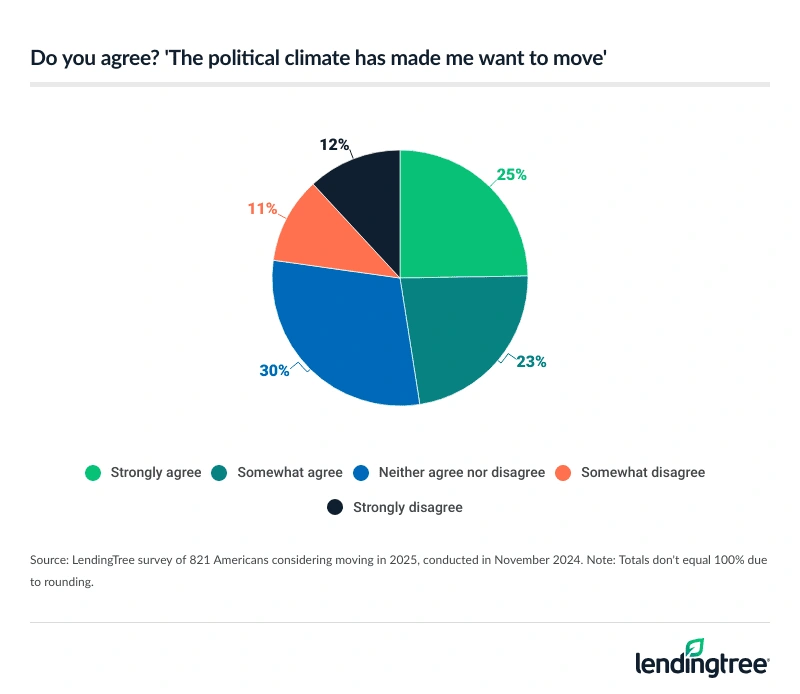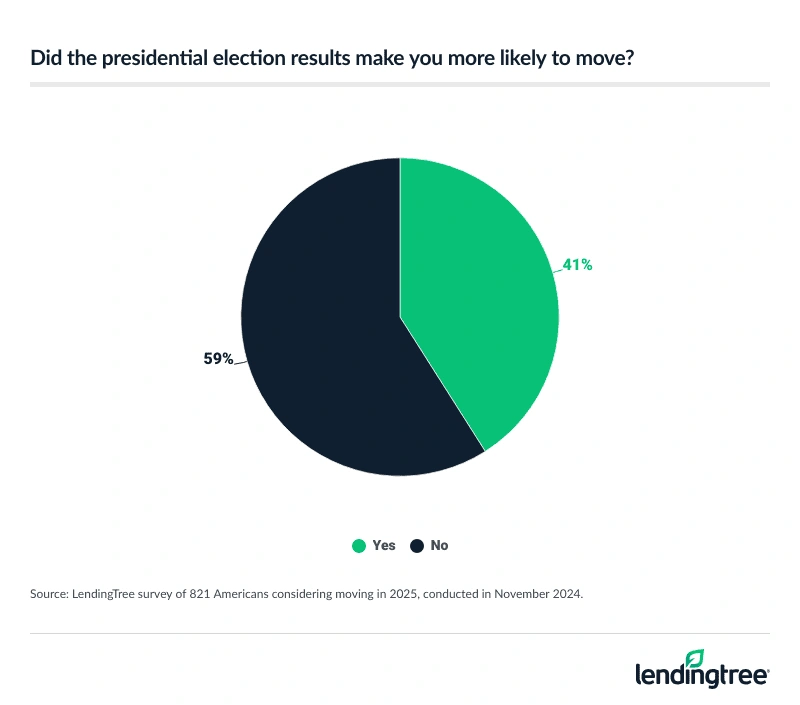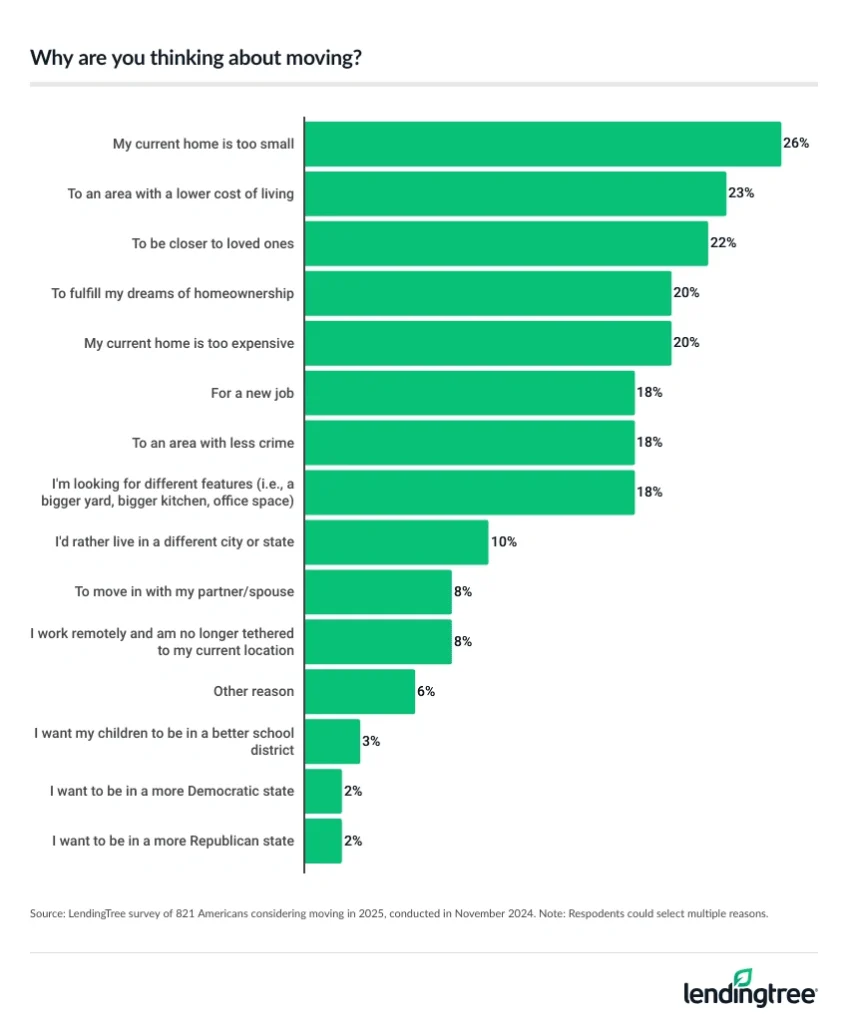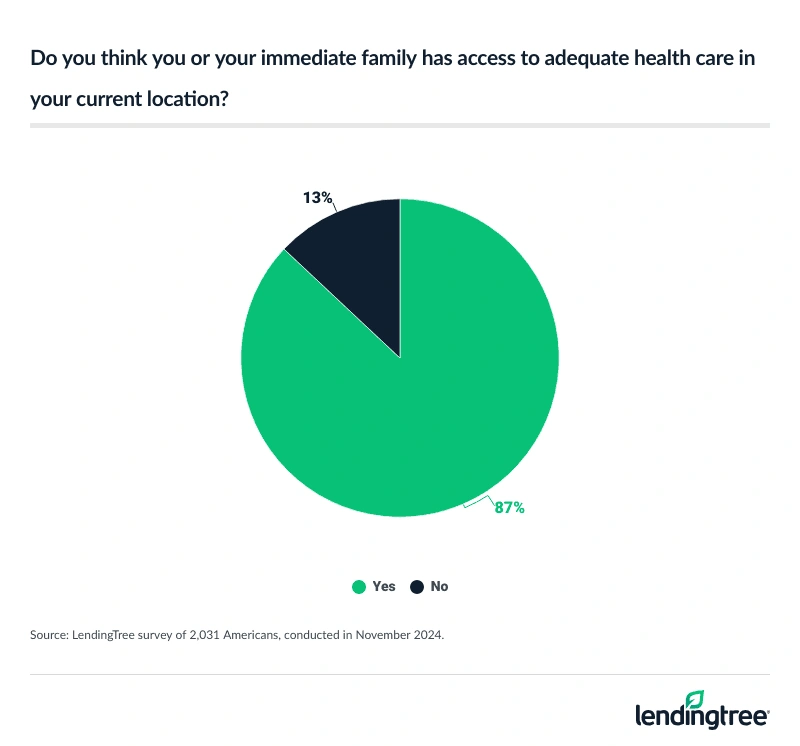48% of Americans Considering Moving in 2025 Cite Political Climate as Reason
In the face of uncertainty about what this year might mean for the housing market and the broader economy, 2025 brings plenty of opportunities for positive and negative change.
One change many Americans are thinking about as we begin the new year is whether they should remain in their current homes or seek greener pastures elsewhere. According to LendingTree’s latest survey, 40% of Americans are considering a move in 2025.
Read on to learn more about who’s most likely to have moving on the brain and what’s driving would-be movers to think about heading someplace new.
Key findings
- Many people are considering moving this year. In fact, 40% of Americans say they’re considering moving in 2025. 21% of Americans may move within their city, 10% have their sights set on a new city in the same state, 8% are considering a new state and 2% a new country. If they move, 45% plan to own, while 44% would rent.
- Politics will push people to move in 2025. Almost half (48%) of those who may move say the political climate makes them want to do so. In fact, 43% of all Americans say they’re willing to spend more to live in a place that more closely matches their political ideals and values. This is especially true among Gen Zers (61%) and millennials (53%).
- The result of the presidential election swayed many potential movers. 41% of respondents considering moving say the presidential election results make it more likely. This is especially true among men (47%), with women at just 32%. Across generations, Gen Zers (48%) and millennials (47%) considering moving are most likely to do so because of the election results, compared with 27% of Gen Xers.
- The top reasons for moving vary. Among those considering a move, 26% say their current home is too small, 23% want to move to a place with a lower cost of living and 22% want to be closer to a loved one. Among those who want to move, 28% say they plan to spend a little less on housing than they currently do, and 24% expect they’ll pay a little more.
- Safety and access to health care will play a role in where people choose to live in 2025. While 87% of all respondents say they have access to adequate health care in their current location, 14% of women and 13% of men disagree. On top of that, 11% of Democrats say they don’t feel safe where they live, compared with 8% of Republicans who say the same. Among those who feel unsafe, 62% say they’ll move because of it.
Plenty of Americans are thinking about a move in 2025, but most aren’t planning to go far
Though millions of Americans move each year, most tend to stick around where they already live. Based on the findings of LendingTree’s survey, this trend looks likely to continue this year.
In total, 40% of Americans say they’re considering a move sometime in 2025, while 60% say they plan to stay put. Broken down, 21% of respondents say they’re considering moving within their current city, 10% are considering moving to a new city in their current state, 8% would head to a new state and 2% want to move to a new country.

Gen Zers and millennials are the two demographics whose members are most likely to have moving on the brain. In fact, 66% of Gen Zers ages 18 to 27 and 51% of millennials ages 28 to 43 say they’re thinking about moving to a new location — the only demographics where a majority of respondents are actively thinking about moving.
Regardless of generation, parents with kids younger than 18 are also relatively more likely to consider a move than most other demographics, with 49% saying they might settle down in a new location this year.
Conversely, 82% of baby boomers ages 60 to 78 say they plan to stay put in 2025, making them the group least likely to be considering a move. Parents with kids 18 or older (72%) and Gen Xers ages 44 to 59 (66%) also say they’re not moving at a higher rate than the overall population surveyed.
Regardless of whether moving is in the cards for you this year, it’s important to recognize that even the best-laid plans can go awry. Your present moving-related goals might change significantly by the time 2025 ends.
Politics are on the minds of many considering a move
After November’s presidential election results, politics are top of mind for many as we begin the new year. About half (48%) of would-be movers say the current political climate makes them want to move. By party, 58% of Democrats cite politics as an incentive to move, compared with 50% of Republicans and 36% of independents who do the same.

Digging deeper, 41% of would-be movers say the latest presidential election results make them more likely to move. At the party level, that figure is 48% for Democrats, 42% for Republicans and 32% for independents.

On the whole, 43% of Americans say they would spend more money to live in a place that more closely matches their political ideals and values.
At first glance, politics might not seem like a good enough reason to prompt a move. But while some political disagreements are trivial, others aren’t. If you find the political climate in your area is making you feel unsafe or limiting your ability to live a healthy and productive life, that’s a valid reason for trying to go someplace else. If you need to spend more to live in a community that accepts and is tolerant of your lifestyle and beliefs, that could be a worthwhile investment.
Would-be movers list a variety of reasons for why they’re thinking about a change in scenery
While many would-be movers think about politics, it isn’t the only reason people are considering a move. On the contrary, plenty of other issues are more likely to be top of mind.
For example, the most common reason for those thinking about moving in 2025 (cited by 26% of would-be movers) is that their current home is too small. Outside of size, the other two most popular reasons are a wish to reside in an area with a lower cost of living (23%) and a desire to be closer to loved ones (22%).
Other key considerations are to escape a current home that’s too expensive and to fulfill the dream of homeownership (both cited as a reason by 20% of would-be movers).

While some reasons for moving are more commonly cited, rationales often vary by demographic.
For example, 31% of parents with kids younger than 18 say they’re considering moving because their home is too small. That’s higher than the 22% of parents with adult children who say the same. Similarly, Gen Zers are far more likely than older generations to say they’re considering moving to find a new job. A third of Gen Zers cite finding a new job as a reason they want to move, compared with 19% of millennials and 10% of Gen Xers.
This shows how much factors like your current lifestyle or age can influence your desire to move and what you’re looking for in a new place to call home.
Though rare, some Americans have major concerns about their current communities
A large majority of Americans (89%) report feeling safe in their current location. Similarly, 87% say they and their families have access to adequate health care where they live, while 76% of Americans think their values align with those of their community.

Of the 11% who don’t feel safe where they live, 62% say they’ll move as a result.
On one hand, these figures are encouraging because they indicate that most Americans don’t feel as though they’re at risk of harm where they live. On the other hand, it’s worth acknowledging that safety and security aren’t universal. It’s also important to highlight how moving out of an unsafe situation is often easier said than done.
For this reason, those living in an area that isn’t conducive to their well-being should remain cognizant of danger and be proactive about getting out. Aid designed to help people find better housing — such as housing vouchers — exists. If you plan to move somewhere new, keep your safety in mind and properly vet any location you’re considering moving to before you pack your bags or sign paperwork. If something you read about online sounds too good to be true, there’s a good chance it is.
Tips for movers
Though moving is sometimes necessary, it can also be stressful and expensive. The following tips can help would-be movers keep their costs — and sanity — in check.
- Do your research. Finding a new home can be exciting, but plenty of pitfalls can trip you up if you’re not careful. Before settling on a new area (even if it’s just a new neighborhood in your current area), look at it holistically. Figure out what recurring costs or other drawbacks you may have to deal with — like homeowners association (HOA) fees — and be honest with yourself about its benefits and drawbacks. Don’t rush to a new area because you find one or two things about it appealing, especially if there are downsides, like lots of traffic or an expensive cost of living.
- Shop around. Regardless of whether you plan to buy, rent or find another living arrangement in a new area, be sure to shop around and compare costs before you spend any money. In the same way you compare prices and features on houses and apartments before you buy or rent, you can shop around and compare prices on everything from moving vans to a new mortgage. Shopping around can help you save money in the short and long term because it can help you snag a lower interest rate on any money you borrow while moving.
- Give yourself time to save. Moving is often an expensive process that can quickly drain your bank account or drive you into debt if you’re not careful. The more time you give yourself to budget and save for moving expenses, the easier it likely will be for you to tackle them. You should try to give yourself months to put extra cash away and make a game plan for how you’ll do things like sell your current home and/or transport your stuff. The last thing you want to do is wing it and find that your moving expenses far exceed what’s in your bank account.
Methodology
LendingTree commissioned QuestionPro to conduct an online survey of 2,031 U.S. consumers ages 18 to 78 from Nov. 19 to 21, 2024. The survey was administered using a nonprobability-based sample, and quotas were used to ensure the sample base represented the overall population. Researchers reviewed all responses for quality control.
We defined generations as the following ages in 2024:
- Generation Z: 18 to 27
- Millennial: 28 to 43
- Generation X: 44 to 59
- Baby boomer: 60 to 78
View mortgage loan offers from up to 5 lenders in minutes

